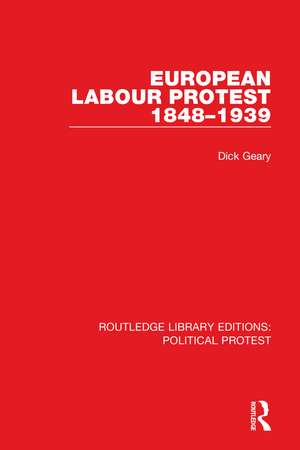European Labour Protest 1848–1939: Routledge Library Editions: Political Protest
Autor Dick Gearyen Limba Engleză Paperback – 15 mar 2023
| Toate formatele și edițiile | Preț | Express |
|---|---|---|
| Paperback (1) | 221.45 lei 3-5 săpt. | +10.76 lei 7-11 zile |
| Taylor & Francis – 15 mar 2023 | 221.45 lei 3-5 săpt. | +10.76 lei 7-11 zile |
| Hardback (1) | 525.93 lei 6-8 săpt. | |
| Taylor & Francis – 6 sep 2021 | 525.93 lei 6-8 săpt. |
Din seria Routledge Library Editions: Political Protest
-
 Preț: 220.78 lei
Preț: 220.78 lei -
 Preț: 221.01 lei
Preț: 221.01 lei -
 Preț: 224.07 lei
Preț: 224.07 lei -
 Preț: 223.98 lei
Preț: 223.98 lei -
 Preț: 247.84 lei
Preț: 247.84 lei -
 Preț: 305.16 lei
Preț: 305.16 lei -
 Preț: 306.01 lei
Preț: 306.01 lei -
 Preț: 303.47 lei
Preț: 303.47 lei -
 Preț: 303.47 lei
Preț: 303.47 lei -
 Preț: 307.72 lei
Preț: 307.72 lei -
 Preț: 329.55 lei
Preț: 329.55 lei -
 Preț: 326.15 lei
Preț: 326.15 lei -
 Preț: 332.94 lei
Preț: 332.94 lei - 33%
 Preț: 686.76 lei
Preț: 686.76 lei -
 Preț: 309.41 lei
Preț: 309.41 lei -
 Preț: 298.39 lei
Preț: 298.39 lei -
 Preț: 300.08 lei
Preț: 300.08 lei -
 Preț: 304.32 lei
Preț: 304.32 lei -
 Preț: 327.35 lei
Preț: 327.35 lei -
 Preț: 306.01 lei
Preț: 306.01 lei -
 Preț: 306.86 lei
Preț: 306.86 lei -
 Preț: 306.86 lei
Preț: 306.86 lei -
 Preț: 377.30 lei
Preț: 377.30 lei -
 Preț: 302.62 lei
Preț: 302.62 lei -
 Preț: 310.26 lei
Preț: 310.26 lei - 34%
 Preț: 13865.60 lei
Preț: 13865.60 lei
Preț: 221.45 lei
Nou
Puncte Express: 332
Preț estimativ în valută:
42.38€ • 43.78$ • 35.27£
42.38€ • 43.78$ • 35.27£
Carte disponibilă
Livrare economică 04-18 martie
Livrare express 18-22 februarie pentru 20.75 lei
Preluare comenzi: 021 569.72.76
Specificații
ISBN-13: 9781032036809
ISBN-10: 103203680X
Pagini: 194
Dimensiuni: 156 x 234 x 13 mm
Greutate: 0.28 kg
Ediția:1
Editura: Taylor & Francis
Colecția Routledge
Seria Routledge Library Editions: Political Protest
Locul publicării:Oxford, United Kingdom
ISBN-10: 103203680X
Pagini: 194
Dimensiuni: 156 x 234 x 13 mm
Greutate: 0.28 kg
Ediția:1
Editura: Taylor & Francis
Colecția Routledge
Seria Routledge Library Editions: Political Protest
Locul publicării:Oxford, United Kingdom
Public țintă
Adult education, General, Postgraduate, Undergraduate Advanced, and Undergraduate CoreCuprins
1. Introduction 2. The Emergence of Organised Protest 3. Maturation and Organisation, 1890-1914 4. War, Revolution and the Rise of Communism 5. Conclusion
Descriere
This book, first published in 1981, examines the issues inspiring working-class movements after 1848 in Europe. It concentrates on the attitudes of the ordinary working men, rather than the ideologies and the leaders, and considers the many different forms and manifestations of their grievances and means of expression.
